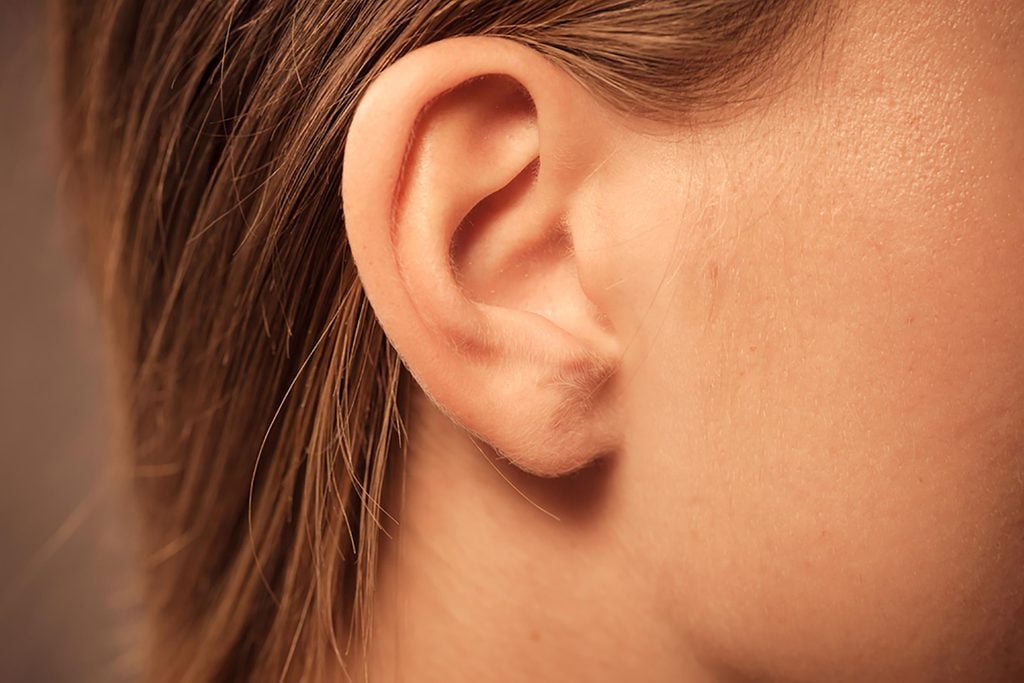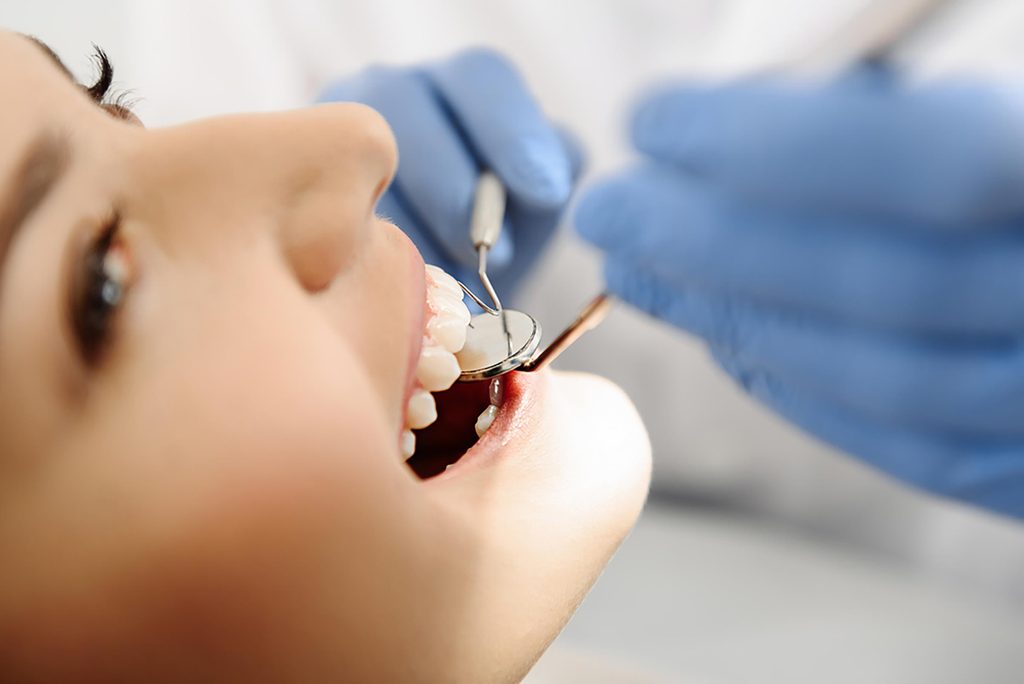
Improves memory
Chew this one over: If your memory is crashing on you lately, the solution may lie in a simple stick. According to recent studies from a team of psychologists at St. Lawrence University, cognitive function and overall test performance were significantly improved when subjects were chomping on gum. Ultimately, it’s believed that this valuable mental boost derives from the observed increase of heart rate and blood flow. The medical results certainly proved this to a T: Brain activity in the hippocampus, an area important for concentration and reaction times, was significantly sparked and delivery of oxygen to the brain was increased by as much as 25 to 40 percent. (Check out these other ways to better boost your brain health.)

Reduces stress and anxiety
Do you ever feel better biting your nails and shaking your legs when you’re nervous? Well the same concept applies here; nibbling on some gum serves as a fantastic substitute for instinctual nervous habits. But don’t just take our word for it: In a 2011 study, participants who chewed gum twice a day for 14 days rated their anxiety significantly less than the non-chewers, reporting higher moods and lower fatigue levels. Scientifically speaking, it was shown that gum chewing can significantly reduce the stress hormone cortisol because the simple act of chewing is calming for most people. Now that’s something to cheer—or chew—about! Check out these other natural ways to ease anxiety.

Helps you lose weight
If you’re slammed with a case of the midday munchies, popping in some gum over that bag of chips may be beneficial to your weight-loss regimen. Not only does this cut your calorie count, the gum will start to act as a “signal” over time that you don’t need to eat anymore. This effectively curbs your cravings and makes you consume less. Medical studies show that the biggest benefit comes from those who reach for a stick of gum instead of reaching snacks between meals. The mindless nibbling has been proven to help suppress appetite; research from the University of Rhode Island showed that people who chewed gum ended up swallowing 67 percent fewer calories at lunchtime than non-gum chewers. (On the other hand, here are the weight loss tips you should stop following—stat).

Combats nausea
Prone to morning or motion sickness? Herbal gums may just become your holy grail. The ginger elements and extra saliva production works to aid digestion and stomach irritability. Recent research even suggests that chewing a piece of gum could be more effective than leading drugs for nausea. In the study, women who felt sick after surgery received either a stick of Wrigley’s peppermint gum or the anti-nausea drug ondansetron while recovering. Surprisingly, the gum was more effective–75 percent with gum said it fully resolved their problem within 10 minutes while only 37 percent of the drug group ever experienced relief. Doctors note that chewing gum is frequently prescribed by colorectal surgeons to help patients stimulate their digestive system after major bowel surgery. Further studies have backed up this claim that gum chewing is an effective intervention due to its low cost and convenient lack of side effects. If chewing gum doesn’t do the trick, check out these other natural remedies for motion sickness.

Helps you poop
For those feeling a bit constipated lately, drop the laxatives and try out the more natural (and inexpensive) gum remedy first. Chewing gum has been proven to stimulate bowel movements by increasing the production of gastric juices without having to digest any food. According to a PubMed study, this can also help prevent the problems many people have when they start eating or drinking too soon after surgery. (It’s why chewing gum is an absolute must for C-section patients.)

Aids acid reflux
If you’re wondering how something as elementary as chewing gum affects something as complicated as acid reflux, it’s actually rather simple. Medically speaking, acid reflux happens when the stomach acid gets congested in the tube that connects your throat to your stomach, also known as your esophagus. This results in the irritable burning and sour sensation that is regurgitated food. Per a study in the Journal of Dental Research, chewing gum causes your saliva to become more alkaline and swallowing more frequent. Consequently, the acid is steadily neutralized and inflammation is reduced, effectively soothing your esophagus in the process. Find out the foods you must avoid if you have acid reflux.

Increases alertness
Getting eight hours of sleep is wonderful, but not always possible on a daily basis. If you find yourself nodding off at your desk, don’t resort to popping caffeine pills and chugging coffee cups. Studies have shown that chewing gum increases alertness due to the constant movement of the jaw. This repetitive activity is said to combat daytime drowsiness via heightened cerebral activity. Basically, chomping stimulates the nerves and areas of the brain linked with arousal by increasing blood flow to that location. In turn, people are left feeling awake for longer periods of time. To be most effective, choose mint-flavored gum for that extra hit of freshness. (If you’re tired and need to stay up, take note of these 12 scientifically proven tricks to staying awake.)

Relieves ear pain
While flying can be exciting, fluctuating air pressures is definitely not as enjoyable. The intense earaches are quite the aerial nuisance, but luckily there is a way to combat it (and all it takes is a 99-cent pack of gum at the airport). Don’t sit there repeatedly opening/closing your jaws and pinching your nose—it’s not medically effective and you’ll probably end up looking rather ridiculous to your seatmates. On the other hand, the jaw movement and saliva production that’s yielded from gum chewing efficiently assists in equalizing the pressure in your ears. In other words, you can say goodbye to ear popping and get a refreshing burst of flavor in the process.

Prevents cavities and strengthens enamel
Even dentists give the thumbs-up on this one—chewing sugarless gum in particular has been indicated to have a similar effect as fluoride-containing toothpaste and mouthwash. According to Medical Daily, this simple activity can kill 100 million bacteria in ten minutes. In fact, the American Dental Association (ADA) reports that chomping on sugarless gum for 20 minutes after a meal can prevent tooth decay and gingivitis. Essentially, it works by triggering the flow of saliva in your mouth, which in turn washes away food and neutralizes acids left behind from other drinks. According to Colgate, “The saliva also contains additional calcium and phosphate to support the strengthening of enamel. With stronger enamel, your teeth have a better chance against decay and cavities.” Dentists encourage people to visit the dentist every six months, so adopt this simple (and affordable) solution to enhancing oral health in between visits. Even better, look for gums with xylitol, which can further reduce decay-causing bacteria by supplying minerals to your teeth. (Not sure if you have a cavity? These are the 9 clear signs you shouldn’t ignore.)
